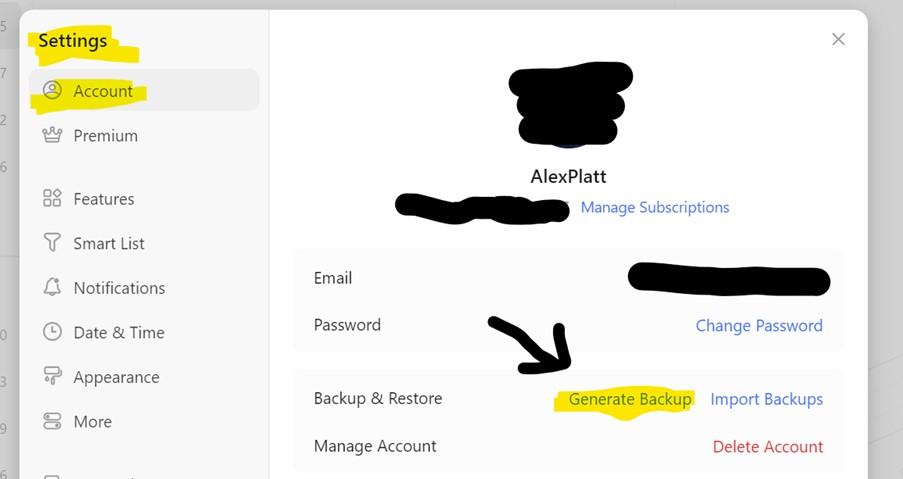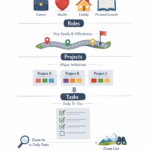
Why You Need to Track Your Time
Part 1 – Discovering My Time Managment Flaw
![]()
Naughty, naughty – I’ve not been time tracking.
Recently at work, my to-do list has been piling up to such an extent that I’ve had no choice but to leave about 50% unstarted. These tasks don’t even see the light of day. And guess what? It hasn’t really changed much.
The fact that these tasks are getting left to rot in the dirt has had no negative effect on the business to my knowledge, and certainly not on me. It got me thinking, how many of these tasks are a complete waste of time and unnecessary? The epitome of pseudo-productivity.
The amount of work that comes my way that’s not thought out is staggering. “Please can you check how many X are in this selection?”, “Do we have the capacity to do X?” (which we have absolutely no reasons as to why we think it’s important). “Can you tackle this fast-track project because we think there may be an opportunity even though it’s going to be delivered badly due to lack of time?”
I have found that asking people the reason for their requests has a 50% success rate of stopping the request before they’ve even really had a chance to ask it. Now I’m asking everyone why they think their requests are important, required, and why I should be looking at them as a priority.
It then got me thinking, when we do accept a new task, should we be reprioritising that task within our to-do list right there and then? If we are assuming this 50% task rejection rate is correct and you have 10 requests come through in the day, that’s 5 new tasks per day.
So that’s 5 prioritisations per day. And that’s only really counting work-related queries. What about life admin and personal relationship tasks that come up throughout the day?
This question really made me think. How did I not notice this was happening and what can I do to change it? I think the reason was – I didn’t really have true visibility of where I was spending my time, and I was not analysing whether this was worthwhile or not. Put simply, I was not time tracking. The real question is:
Should you constantly be assessing your time spent each week, and can task management apps allow you to do this?
So is it time to start tracking my time more stringently? So I can constantly assess where it’s best spent?
Each blog post, I want to try and solve a problem or answer a question. Above is the question and problem I am going to aim to solve. The first step to doing this is getting an accurate split of my time across the week. As I time block my weekly calendar extremely accurately, I’m going to see if I can use this from TickTick to see the split of my time.
I don’t want to resort to a time tracker app, because inevitably it won’t be as accurate as I will not be able to remember to time everything to the tee.
Part 2 – Making my weekly time tracking dashboard
I use TickTick, a great task management app that is incredible for the time management technique of time blocking, where you split your day or week into chunks of time in which you plan to do certain tasks. Unfortunately, after taking a look at TickTick’s statistics page where you can see your stats across a given time period, there was no easy way to see a split of time spent by category based off my calendar. This was what I was after.
You can, however, export all your tasks to a CSV file. So I did this and created a simple Excel dashboard, where I can select the week and see a split of my time across the categories in which I time block.

You can generate a CSV of all your tasks via the ‘generate backup’ feature in the settings of Tick Tick through the web app.
It works well, and I can also select a specific category to get the tasks for the week for that category and see a more granular view if needed.
My hope is that I can now use this to analyse where my time is spent when I plan my week. I should be able to see if there is a noticeable increase in one area and how it has impacted me. I can see if certain tasks were worthwhile and weigh up the time taken versus the results they gave.
Having this view available so easily means I can make more informed decisions when changing my routine and schedule.
Below is a snippet of the dashboard I made:
![]()
The good thing about this is that I don’t have to stringently stop and start a stopwatch in a time tracking app. I can just utilise my time-blocked schedule which I’m already in the habit of creating on a weekly basis.
I don’t have to fill in the hours I spent anywhere – it will just be natural and not take up extra time or add friction to me completing my tasks with the dread of having to remember to time them. Furthermore, it will be more accurate as realistically I would have forgotten some tasks and even retrospectively filling in the time I would probably be just guessing.
Whilst this time-blocked schedule also won’t be 100% accurate – it will be a pretty good representation of my week. The main thing is seeing how the different categories change over time.
Back to my original question posed though…
Should you constantly be assessing your time spent each week? And can task management apps allow you to do this?
In short, yes to the first point and sort of to the second point. I definitely think you should be assessing where you spend your time at regular intervals. That is because seeing where you have spent your time the previous week and analysing the results of that time spent is how I imagine you can gain valuable insights into what tasks you should be undertaking in the next week.
TickTick in my case did not have the analysis I needed, and so I had to do this using Excel. But I certainly think it will greatly benefit me going forwards and avoid me missing obvious issues like spending time on pseudo-productive activities that, in hindsight, would have made no real difference to me if they had been completed or not.
The main reason for my implementation of this strategy is to monitor the progress I make with this ‘power of planning’ project. I have limited time to spend on it each week. You can see that the week commencing 5th August I have spent 9 hours on the power of planning category on my time tracker. I want to easily be able to see what those tasks were and the benefits they gave me. This can then inform me on how I want to allocate my time the following week.
Was writing a blog post myself with no help from AI useful? Did it have the impact I wanted on my audience? Was the time I spent creating and scheduling Instagram content worthwhile? Should I spend more time creating on TikTok vs Instagram? Did the 2 hours of reading around the topic of digital marketing give me any valuable insights?
The natural next step is to measure the benefit of each task and ideally give them a score that can be ranked.
This isn’t so easy. I need some key metrics to allow me to do this. First, I need some measurable goals that I need to achieve. Some of my goals are:
- Grow my audience.
- Improve my time management.
- Start to generate some revenue from the power of planning in order to make the endeavour more sustainable and allow power of planning to scale.
- Make personal time management more accessible, and condense the most powerful techniques so they can be understood in the quickest and easiest manner possible.
They need to be specific, measurable, attainable, relevant, and time-bound. So let’s amend them so they tick all of those:
- Grow my Instagram audience to 2,500 and my Facebook Audience to 1,000 by 1st October 2024.
- Start reviewing the previous week’s time spent to inform the next week’s plans for 80% of my weeks.
- Generate £5+ in revenue or contributions for the months of September and October from the power of planning.
- Provide 5 new free guides on my Stan store page that accurately summarise key concepts aimed at specific demographics by the end of October.
- Research the bestselling digital products in the area of time management and how I can add value in this niche – create products based on this information.
- Create a resources dictionary to aid people starting out in time management with my main tips and resources to use.
I am going to leave it here for this blog post. It’s been a while since my last one as I was focusing on creating content on Instagram and growing my audience. I will follow up on how I have applied my new time tracking insights to my personal time management and the power of planning’s growth. It will be really interesting to see if this change has a positive impact on the results I see going forwards and if this is reflected positively with engagement across my socials and benefits those who come across my content.
Cheers,
Alex

















Navigating AI tools can be overwhelming, but AIGO Tools simplifies the process with curated solutions. Their AI Email Generator is a smart addition for professionals seeking efficiency.